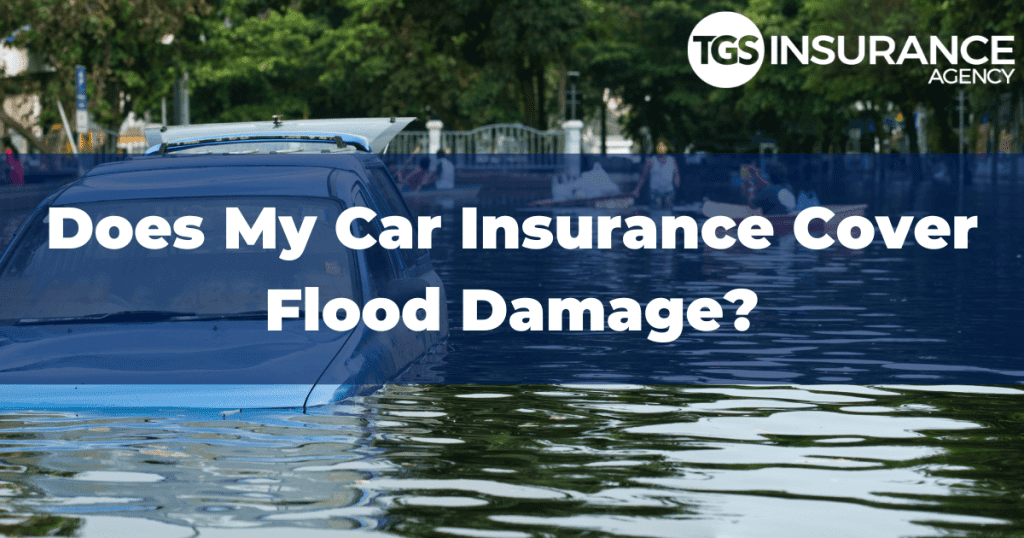
Floods can be devastating events and bring about destruction in more ways than one. It’s not just homes or businesses that bear the brunt of flood damage. Cars make up a substantial portion of losses during a flooding event. There was an estimate of over half a million cars were destroyed in the floods of Hurricane Harvey totaling $5 billion in damages. So you are far from alone if you find yourself in a situation where you ask: “does my car insurance cover flood damage?”.
If a catastrophic flood destroys or damages your vehicle, it’s important to know and understand how your auto insurance policy may or may not help. Most people don’t know that your auto insurance can help you if your vehicle sustains damage from a flood- as long as you’ve got the right coverage.
Know What Type of Auto Coverage You Have
In the state of Texas, drivers are required to have a basic auto insurance policy with a minimum coverage of $30,000 per injured person and at least $60,000 per accident. In addition, Texas drivers must carry coverage for property damage for at least $25,000. Why is this important? Because basic car insurance policies don’t come with comprehensive coverage, which is an optional add-on to your auto insurance policy that covers you if your vehicle is damaged in a flood.
Comprehensive coverage isn’t limited to just flood or water damage. It covers several other things, including:
- Theft
- Vandalism
- Hail
- Lightening
- Fire
- Falling objects
- Civil disturbance
- Damage from animals
- Water and flood damage (includes losses from hurricanes and flash floods)
Like any other coverage, comprehensive coverage comes with a deductible that ranges from $500 to $1,000. Comprehensive coverage is typically paired with collision coverage. However, it’s not like liability coverage that would protect against damage you inflicted on other drivers or vehicles, comprehensive covers your vehicle specifically.
How Much Does Comprehensive Coverage Cost?
The answer to this question varies depending on a few things but mostly comes down to the value of your vehicle. Driving an expensive vehicle will result in a higher premium because it would cost the insurance company more money to replace it. And vice versa, your premium would be less expensive if you’re driving a cheaper vehicle.
Do I Need To Buy Comprehensive Coverage?
If you own your car and have no outstanding payments, you won’t be required to carry comprehensive coverage, but it’s a good idea to have it if your car value exceeds $4,000. If you’re leasing or financing a car, you’ll likely be required to carry comprehensive collision coverage. If you don’t carry either comprehensive or collision coverage, you won’t receive a payout if you file a claim due to damage or totaling your vehicle.
If you live in an area that is prone to natural disasters, such as a coastal city or in an area that floods frequently, comprehensive coverage may be something you’ll want to consider adding to your auto insurance policy. It’s important to note that you must carry comprehensive coverage before your vehicle sustains water damage or anything else for which you’d want to submit a claim. Another thing to think about is if there is a pending storm, insurance carriers may freeze coverage or restrict purchasing comprehensive coverage if you’re in an area that’s in the storm’s path.
To repair a car that’s been damaged by a flood, you can expect to pay anywhere between $50 to $8,000 or more depending on the damage, or your car could be totaled out if the damage exceeds your car’s worth. On average, comprehensive coverage costs $596 per year, with an average of about $228 per year in Texas. Based on that average, you would pay about $19 monthly for comprehensive coverage. Doesn’t that sound feasible compared to thousands of dollars in damage due to a flood? Have one of our agents create a hassle-free quote for you now to see how much yours could be!
What To Do After Your Car Floods
If your vehicle suffered water damage, wait until after the storm passes to try and tend to your car. The last thing you will want to do is try to salvage your car and put yourself in danger.
Once the water has receded, time is of the essence, and you’ll want to move quickly to limit the damage done to your vehicle. Do not turn on your car whatever you do. This could result in further damage. One of the best things you can do for your car is dry it out as soon as possible. The sooner you do this, the better your chances of avoiding total loss.
The single most important thing you can do is contact your TGS Insurance agent or insurance provider as soon as possible to help you get the claims process started. Document the vehicle by taking lots of pictures and videos to aid your insurance adjuster in determining how much of a payout you’ll receive. Another great tip, use whomever your insurance carrier’s preferred body shop is. Doing this may not require a claims adjuster to evaluate the car in addition to saving a ton of time in the insurance claims process.
Protect Your Vehicle With Comprehensive Coverage
The only way to guarantee that your vehicle will be protected during a flood is by adding comprehensive coverage to your auto insurance policy. While liability or collision coverage is a great bonus, it will not help you if your car floods or sustains water damage.
Adding comprehensive coverage to your auto insurance policy is easy with TGS Insurance. Our team of knowledgeable agents will be able to shop the best option for you- it’s insurance made easy!